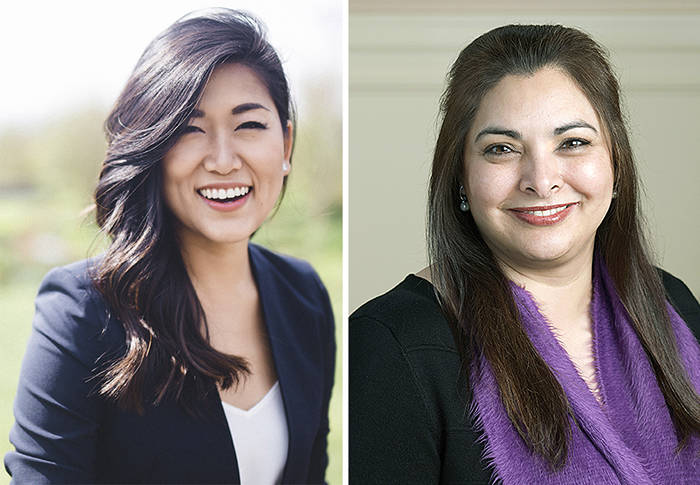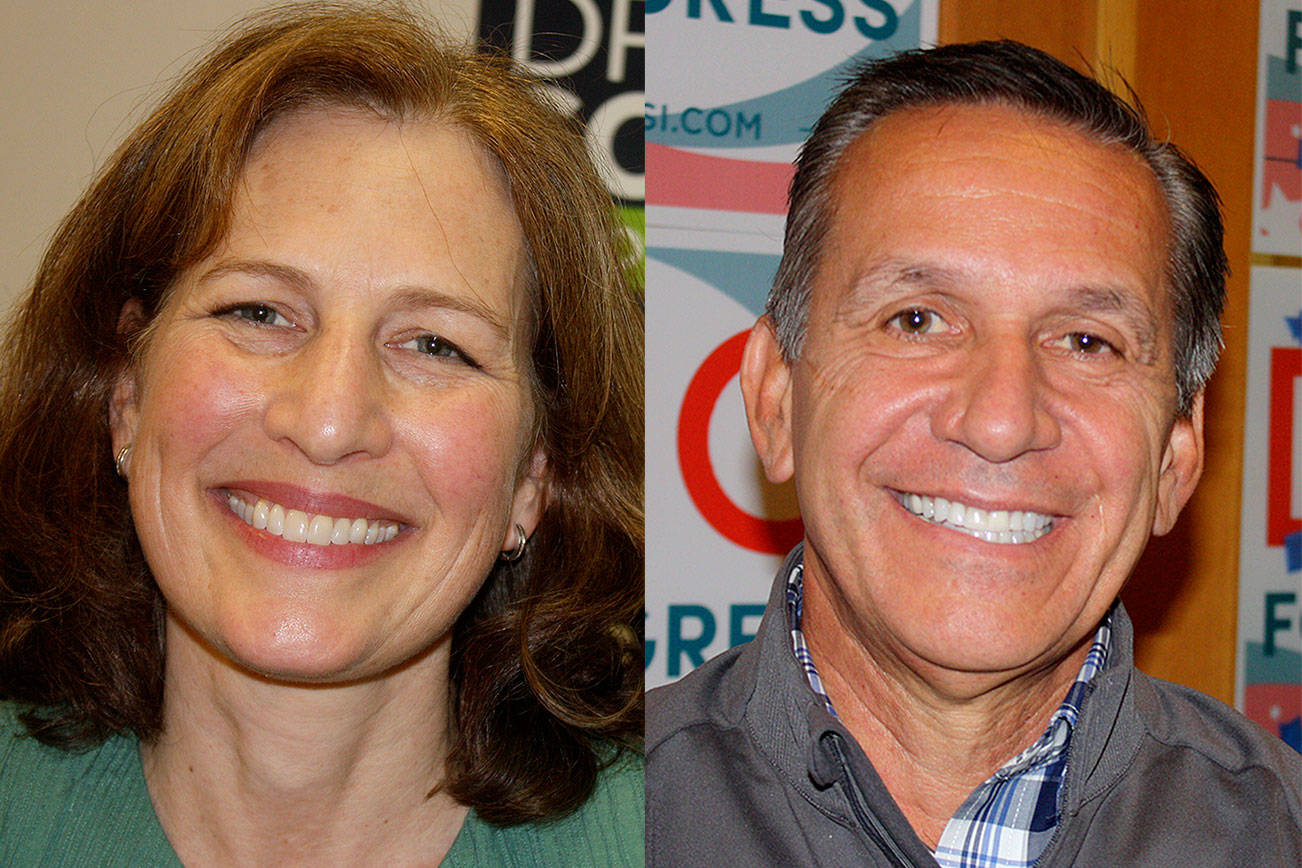Control of the Washington legislature hinges on one race this November. And that control will likely determine whether Washington could end up in 2018 with a capital-gains tax, mandatory abortion insurance, increased Internet privacy rules, and a possible tweaking of a new property tax.
That one race is the 45th District’s state Senate race in the northeastern Seattle suburbs between Democrat Manka Dhingra and Republican Jinyoung Englund. Right now, Republicans hold a 25–24 edge (with the aid of a maverick Democrat who caucuses with the GOP) over the Democrats in the Washington Senate. With Democrats in control of the governor’s office and the House, the GOP-dominated Senate has stopped major Democratic legislation for five years. It depends on your political views whether that is good or bad.
In October 2016, the 45th District’s Sen. Andy Hill (R-Redmond) died of cancer, leading to a special election this November to fill his seat, now temporarily held by Republican Dino Rossi, who recently announced his intention to run for the Eighth Congressional District seat being vacated by retiring U.S. Rep. Dave Reichert.
The affluent 45th is Washington’s purplest swing district, including parts of Redmond, Kirkland, Duvall, Sammamish, Woodinville, and a huge chunk of rural upscale commuter neighborhoods.
Hill, a moderate, won the 45th District with 53 percent of the vote in 2014. However the 45th’s two state representatives, Larry Springer and Roger Goodman, are Democrats who were easily re-elected in 2016. The district has leaned Democratic on national races, with Clinton winning by 35 percentage points last year—a larger margin than Obama’s 17 percent win in 2012.
Meanwhile, people of color are moving to the 45th, bringing more diversity to a district that is two-thirds white.
In the August primary, Dhingra captured 51.5 percent of the votes, while Englund took 41.5 percent. Independent Parker Harris, who has since endorsed Dhingra, won 7 percent. An informal political rule of thumb is that a 10 percent deficit in a primary is almost impossible to overcome in the main election. “I think the race will be close,” says Tina Podlodowski, chairwoman of the state Democratic party. (Republican state chairwoman Susan Hutchison declined to be interviewed.)
“I was very surprised by the results in the primary,” Dhingra says.
Englund adds: “I’m not discouraged. We always knew we’d be the underdog in this race.” Both candidates are Asian-American women, both political novices—and both believe their statuses as women of color cancel out each other as political factors.
Donald Trump’s election spooked Dhingra, spurring the 43-year-old King County senior deputy processor to begin to attend political meetings. Most participants were women, many of color. Deportation rumors kept arising, scaring many. People encouraged her to run.
Born in India, Dhingra’s family moved to the United States when she was 13, and she moved to King County when she was 22. Chair of the county’s Therapeutic Alternative Unit, she also supervises the county’s Veterans Court, which serves veterans with PTSD. Her husband works at a private spaceship company.
Englund, 33 of Woodinville, has worked extensively in the bitcoin industry in the Pacific Northwest and in Washington, D.C. Englund joined the GOP because it is more fiscally conservative, she says, citing her time at a nonprofit in Mozambique, where she prepared spreadsheets to show donors that their money was being spent properly. A second-generation American of Korean descent, Englund will be the only nonwhite Republican in either the House or Senate if she wins in November.
For rookies, the pair are collecting campaign contributions at record levels—at least $1.65 million for Dhingra and at least $1.54 million for Englund, according to Washington Public Disclosure Commission records. Heavy contributors to Englund include oil companies and business interests; Dhingra’s include many unions. “I do suspect the numbers will be significantly higher [by November],” Podlodowski says. A state legislature candidate typically spends $100,000 to $200,000.
The heavy donations for Dhingra are based on the hope that a deluge of of long-blocked Democratic bills could become laws in 2018. First, the Democrat would be able to modify a controversial property-tax overhaul agreed to behind closed doors just before a partial state-government shutdown would have occurred on June 30 due to the lack of a state budget. The overhaul, a must-have measure for Republicans, bumped up tax bills in metropolitan King County while shrinking taxes in rural areas. If Dhingra wins, Democrats will likely revise that overhaul. If Englund wins, this year’s property-tax changes will likely remain intact.
Then there is the Washington Supreme Court’s 2012 McCleary ruling that ordered massive changes to how the state government funds basic education, which has deadlocked Democrats and Republicans for five years. On Oct. 24, the Supreme Court will hear arguments on whether the legislature finally has met the McCleary ruling’s mandate with the property-tax overhaul. It is unknown when the court would announce its decision.If the Supreme Court rules that the legislature has failed, the 2018 legislative session will have to deal with the follow-up.
In the past, Senate Republicans have balked at tackling McCleary fixes in the 60-day short sessions in the even-numbered years of 2014 and 2016, preferring to do McCleary work in the main budget-oriented 120-day sessions in the odd-numbered years of 2013, 2015, and 2017. Consequently, a Dhingra victory would make any McCleary fix-it work more likely in 2018 than would an Englund victory.
If more McCleary work is needed, the Democrats will likely move on to a capital-gains tax.
For five straight years, Democrats have proposed a capital-gains tax to raise money for education. Democrats have proposed a tax of 5 percent on individuals making at least $25,000 in a year, and on couples making at least $50,000 a year, in capital gains. Gains from transactions involving primary homes, retirement funds, and most agricultural and timber-related gains would be exempt. It is estimated that 32,000 Washingtonians would pay the tax, which would raise $550 million per budget biennium. Senate Republicans have stymied the proposal every year it’s been introduced, and if Englund wins, it will remain dead on arrival in the Senate. If Dhingra wins, the tax will likely be introduced and pass.
Also if Dhingra wins, Democrats would likely revive the Reproductive Parity Act bill, which would require health insurance that covers maternity care to also cover abortions. House Democrats annually sent that bill to the Republican Senate from 2013 through 2015, and it always died in the Senate Health Care Committee. (Democrats did not introduce the bill in 2016 and 2017.) The bill would likely sail through a Democratic Senate.
Another bill likely to pass with a Dhingra win would forbid Internet providers from selling your personal information without your permission. Early this year, Trump signed a law that allows companies to sell such data. Washington legislators introduced bipartisan bills in the Senate and House to reinstate those protections. But Republican Senate leaders decided not to move either bill along.
“We have a caucus of ‘No’ in the Senate,” Dhingra contends.
Meanwhile, Englund argued a Republican Senate keeps Seattle’s liberal proposals, such as a steady stream of tax measures, from spilling over into the 45th District and state, where they don’t fit. “What happens in Seattle impacts us all… . Why does the state need more money? Why does the state need more taxes when we’re already paying through the nose?” Englund says.
Dhingra retorts: “It’s a huge stretch to equate me to a Seattle style of politics.”
news@seattleweekly.com








